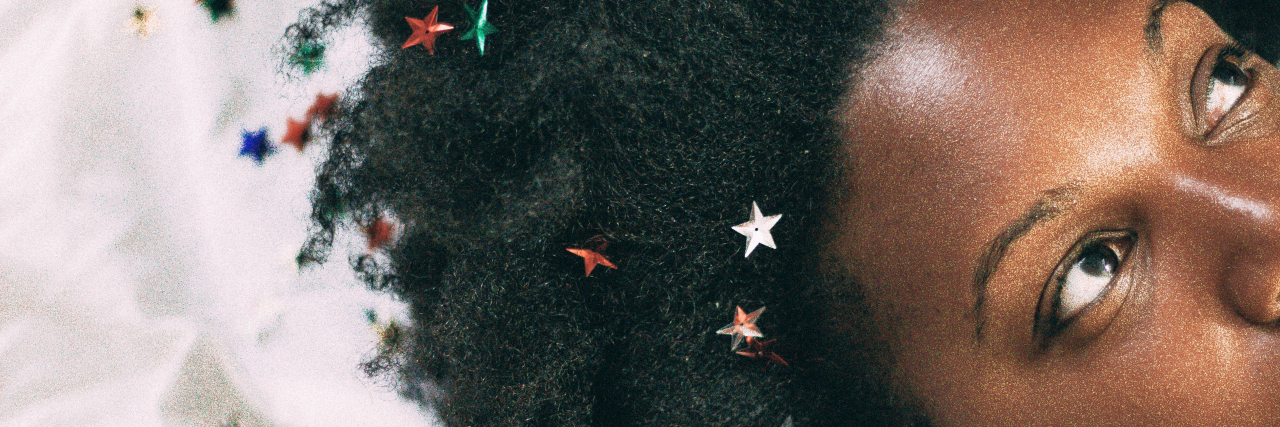My Momma Told Me Only White People Go to Therapy, Not Black Girls Like Me
Editor's Note
If you’ve experienced suicidal thoughts, sexual abuse or assault, or an eating disorder, the following post could be potentially triggering. You can contact The National Sexual Assault Telephone Hotline at 1-800-656-4673.
You can also contact the Crisis Text Line by texting “START” to 741741, or by texting “NEDA” to 741741 or eating disorders.
My mom called me into her bedroom. She held up my English notebook. I was in ninth grade. I knew in that instance what her snooping had discovered. I had been very depressed over the course of my time in high school. I had a lot to be depressed about. I was being sexually abused in my home.
I had stopped eating and was barely hanging on. The only thing that gave me solace was my daydreaming about dying by suicide. I was planning it for months. I was going to end my life and free myself from all the anguish I was feeling. I was going to stop the pain one way or another.
Since I was not eating any longer, I spent my lunches in the common area at school. I would spend the entire time working on the “perfect” suicide letter. I used the back of my English notebook.
So, imagine my surprise when my mom showed up with my notebook. She asked, “do you have something to tell me?” I said no. She said, “what is this letter at the back of your notebook?” I had to think quickly. I was completely caught off-guard.
I stated that the note was an English assignment and that I was not doing anything with it.
To somewhat of a surprise, she said, “OK.” That was it.
I attempted suicide not too long after that encounter.
In that moment, I could have told her what was going on with me. The reality, however, is that she would not have helped me. See, my family felt that what happens in the family stays in the family. I never could have asked to get help. My parents believed that therapy was something middle-class white people did. That therapy had no value and that if you had problems, you should take them to your pastor or pray it away.
The reality is that therapy is helpful for all kinds of people. I have found that keeping family secrets is toxic and leads to abuse and neglect.
Black people having the mindset that therapy is not for us is a dangerous mentality. Therapy has been a gift to me. It has helped me cope and heal with the years of abuse I suffered. It helped me grieve my childhood and not get lost in the grief. It has helped me build up my self-esteem. It has helped me see the impact of diet culture in my life and has freed me from the dangers of it. It has helped me build up boundaries in many aspects of life and gave me the strength to maintain them. Therapy has given me room to share my darkest fears and get support to heal. It has helped me cope with the loss of my daughter and supported me in grieving. Therapy has made all the difference. I would not be alive without it.
I want to encourage all people, Black people included, to seek out impartial and unconditional support from someone who is trained to help you. You do not need a mental health diagnosis to seek help to cope with your daily life.
I know that it is hard to find a culturally competent practitioner but get started one way or another until you can get the specific help you need. I have had white therapists throughout my treatment, and it has been a challenge but still helpful. I know some of you are underinsured, limited on time, or lack the wherewithal to get to treatment. At least join some free support groups like NAMI.org or dbsalliance.org, check out your local health department, join Facebook groups like Therapy for Black Girls or Therapy for Black Men. If you are in the LGBTQIA+ community, you can get services from the National Queer & Trans Therapists of Color Network. There is help out there for you; just set small goals toward getting the help you need. It will be life-altering. I promise.
My mother failed to act. Change must come so a child like me no longer slips through the cracks. We need to educate parents and talk more in the Black community about mental health and mental hygiene. People are scared when we start talking about these issues but find hearing about these issues that they can identify in themselves or others they care for that symptom are present.
I do symposiums for pastors. On the initial survey, I find that they are illiterate on the issues of mental health and mental illnesses. These are the very people who are sought after when a family has a problem. This must be reversed. The pastors are amazed by what we discuss. They seemed overwhelmed with guilt that they did not know these things.
The Black community has a long history of sweeping these issues under the carpet and making those who do seek help feel ashamed.
There is nothing to be ashamed of. Seeking help shows strength and a willingness to accept support. I often fall victim to the racist trope that Black women must be strong (the strong Black woman). This thinking leaves women feeling they are weak for asking for help.
You are not weak. You are Mighty strong! Ask for help. You can do this.
Photo by Leighann Blackwood on Unsplash

